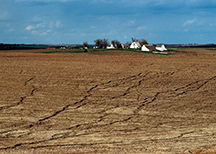Ag conservation publication available from Purdue Extension
October 30, 2014
 |
|
Some farmers might be hesitant to adopt new conservation practices even though doing so could help improve soil quality and prevent erosion, according to the new Purdue Extension publication Adoption of Agricultural Conservation Practices: Insights from Research and Practice. (Purdue Agricultural Communication photo/Tom Campbell) |
WEST LAFAYETTE, Ind. – Agricultural educators, community organizers and others promoting environmental awareness can learn about the myths and realities of agricultural conservation from the perspective of a researcher, practitioner and student in a new Purdue Extension publication.
Adoption of Agricultural Conservation Practices: Insights from Research and Practice, developed by the department of Forestry and Natural Resources at Purdue University, is available for free download from The Education Store.
The authors - Linda Prokopy, associate professor of Natural Resource Social Science, Dan Towery, Indiana Conservation Cropping System Initiative educator, and Nicholas Babin, postdoctoral research assistant in Forestry and Natural Resources - use academic studies and their own observations to address ways of motivating farmers to adopt environmentally friendly farming practices.
One of the major conclusions in the publication is that successful, innovative farmers who use conservation techniques, such as no-till planting, cover crops and nitrogen nutrient management, can be effective role models.
“If others see that a well-respected farmer in the community has success with a practice, then you often see rapid diffusion through the community,” Prokopy writes. “This is happening in Indiana with cover crops.”
In another passage, Prokopy describes the importance of “systems thinking,” which means discussing conservation issues as part of an overall farm management plan:
“That way,” she writes, “whether a farmer is talking to the conservation folks, the chemical dealers or the crop consultants, the language is the same.”
To download the free publication, go to https://www.edustore.purdue.edu/.
Writer: Darrin Pack, 765-494-8415, dpack@purdue.edu
Source: Linda Prokopy, 765-496-2221, lprokopy@purdue.edu
Ag Communications: (765) 494-2722;
Keith Robinson, robins89@purdue.edu
Agriculture News Page

